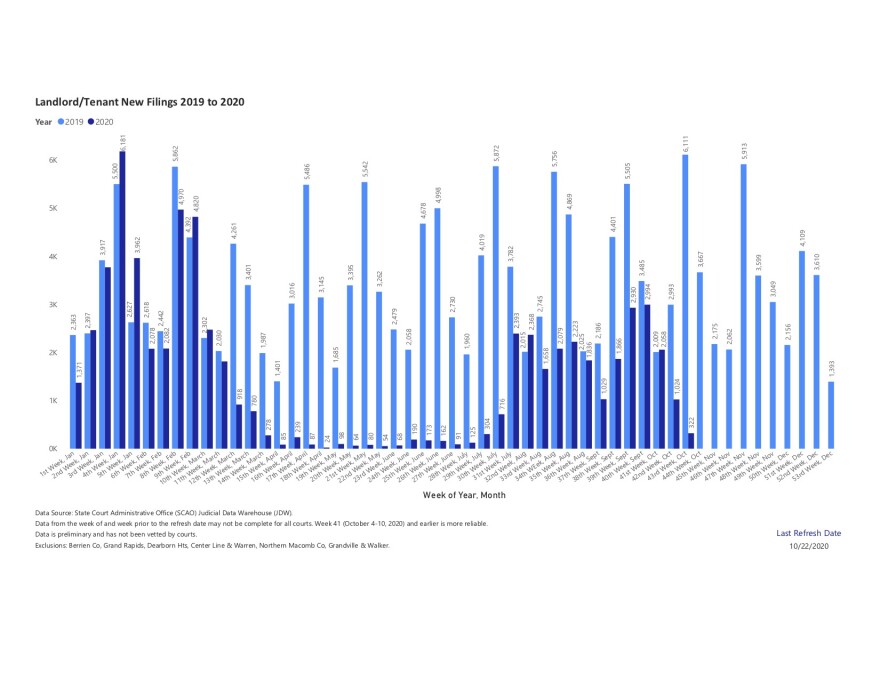More than a month after the CDC issued a nation-wide eviction moratorium for those impacted by the pandemic some experts say eviction filings appear to be on the rise.
The data come from the State Court Administrative Office and show statewide eviction filings have steadily increased since July, when Michigan’s moratorium lifted.
The CDC issued a national moratorium on evictions in September for those impacted by the pandemic.

The federal moratorium requires tenants to sign a declaration protecting them from evictions, but landlords can challenge the truthfulness of the declaration in court.
The declaration has a number of requirements, including that tenants have tried their best to get government assistance for rent, and would likely become homeless if evicted.
According to the CDC, landlords are not required to notify their tenants that the moratorium exists.
Jim Schaafsma is a housing attorney with the Michigan Poverty Law Program.
“Looking at that first week in October it’s only the second time that eviction filings have been higher on a weekly basis compared to 2019 since March when the pandemic began,” he said.
It isn’t clear how many of those eviction filings result in final evictions.
Schaafsma said it’s also not clear how much the CDC moratorium on evictions is actually doing to protect tenants.
“That CDC order that halts some evictions is not a blanket ban on evictions,” he said. “It probably has diminished the eviction case filing numbers but that effect is starting to diminish a bit.”
The moratorium ends on January 1st.
Schaafsma said Michigan’s supreme court issued guidance on the CDC order last week that would allow eviction cases protected under the CDC order to move forward up until the final stage of the eviction process.
“Many tenets would find themselves at the last stage of the eviction process which is the issuance of an eviction order and the final step of the eviction process which is the enforcement of that order shortly after the end of the year,” he said.
Unless there is additional state or federal aid, Schaafsama said there is a possibility that the state will see a huge spike in evictions come January.
Tom Boyd is the state court administrator. He said it is important to note that all three branches of Michigan’s government have come together in an “unprecedented” way.
“It’s working,” he said. “It’s not working as quickly as we would hope, and it’s going to take some time.”
Boyd said the CDC moratorium won’t stop people from eventually being evicted.
“No. And no one can, and I think there’s an argument that no one should. You really do need to pay your rent and play by the rules to be able to stay in your home,” he said. “That being said lots of people are suffering extraordinary stress and there are tremendous programs available.”
The state said it has so far spent $13-million out of its $50-million eviction diversion program.
That funding has helped cover rental assistance for some 3,900 households. Another 2,000 are expected to receive assistance in the next two to three weeks.
Schaafsma, with the Michigan Poverty Law Program, has previously said that the state’s $50-million eviction diversion program isn’t nearly enough to help everyone impacted by the pandemic.
Ultimately, he said, there will need to be more federal aid or intervention to keep people in their homes, especially as the moratorium lifts in January.
“At some point that will be necessary either this year or into next year,” he said. “When you combine growing concerns about the scale of the pandemic along with it being the middle of winter that could be a huge crisis scenario.”

